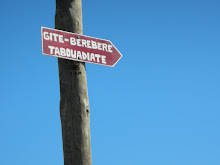So, there are no pictures in this blog post, sorry to disappoint. Also, it might not read logically. Again, bear with me. There are lots of items regarding Moroccan culture that are popping up in my head right now, so I just had the idea to record some of them down. Based on a month of observation, here goes:
The concept of hot and cold is pertinent to many rural Moroccan families, especially pertaining to physical health. One is persuaded against staying out in the cold, especially when he is underdressed. And, upon coming in from the cold, one is warned of the health problems of lost body heat and the cold in general. Wetness complicates this matter: if it is cold AND rainy, there is even more pressure against experiencing the elements. "Brd," a Moroccan would say, referring to the cold. I find this word easy to remember because it sounds like "brrrrr...," something Americans might say after coming in from the cold.
As people might know, the concept of time is a bit different in Morocco, as compared with America. Many Americans embody a "time is money" attitude that segments their days into strict schedules. There is much pressure to adhere to these schedules, as we generally tend to base our self-worth on the amount of things accomplished. Sometimes, relationships are sacrificed at the expense of getting the job done. In Morocco, like many other non-Western societies, relationships are valued more than work and time is not strictly adhered to. As a result, the pace of life is generally slower than in the United States and tasks aren't completed as speedily. I have not had much culture shock in this sense, as the Moroccans that we've been working with have been pretty motivated to work with us. However, I have no doubt that Emily and I will experience this in the next 2 years.
Moroccans are generally less direct than Americans. We tend to say what we mean, and mean what we say. To convey a message, we generally rely on what we say rather than how we say it. In Morocco, there is more emphasis placed on the non-literal meaning of a message: what is implied rather than what is directly stated. For example, let's say that a Moroccan friend were to offer you food, drink, or a favor. If you were to say "no, thank you," your friend would generally not take that answer at face value, even though you really do not want what's offered. It would take 2, 3, or even 4 "no's" to get the idea across. An American might feel pressure in this situation to say yes, and this is what often happens. At first, they may not understand why their Moroccan friend keeps pushing the issue! We have experienced this example of indirectness especially during meals. "Kul! Kul!" (Eat! Eat!) or "Zid! Zid!" (More! More!) typically punctuate dinnertime conversation. My experience of mealtimes thus far is that as long as you keep eating food, you will continue being fed. This is a dangerous combination, especially with foods that are new to one's body. If you're full, say it! Shbet, L Hamdullah (I'm full, thanks be to God!)!
The roles of women and men are generally different in Morocco as compared to America. For instance, in a typical rural family, the women (mother and sisters) do all of the housework, and prefer it this way. If men were to do work within the household, the women would be thought of as worthless or ineffective. They would think of themselves this way as well. Of course, there are exceptions (for example, a non-nuclear or single parent household). Rural women go out mostly during the day for running errands. Men, however, are seen at all times in the streets; they are in the company of other men only. They are to be seen congregating at public cafes, which forbid women. The sexes rarely mix in pubic. To do so would create a bad reputation for the woman involved.
Another differing topic is the concept of space. In a typical rural Moroccan household, there are no separate bedrooms. There is generally a sitting room (living room), a salon (a room for hosting guests, which is generally bigger than the sitting room), a kitchen, and a sleeping room (where any combination of family members may choose to sleep). Sometimes, family members sleep in the sitting room. The bathroom may or may not be inside the house. Sometimes, it is an attached structure with its own entry. Families generally store their clothes together and designate a room for changing clothes. Furthermore, there isn't a whole lot of "stuff" that family members own. There aren't piles upon piles of toys for children. There is no clutter that takes up all the room in the house. It just doesn't exist. The family ties are more important than the individual; there is less emphasis placed on individualism and more emphasis placed on collectivism. Living with a Moroccan family has helped us understand how materialistic, individualistic, and direct our own culture is. Not necessarily bad; just different. Its interesting to consider that we don't really know who we are unless we step outside and look around for differences of which to compare ourselves.
-Jon
Sunday, October 19, 2008
Subscribe to:
Post Comments (Atom)

1 comment:
Wow! Never thought of it that way. Hope you guys are doin ok.
Uncle Mike
Post a Comment